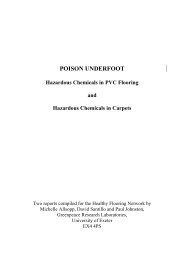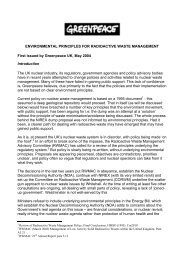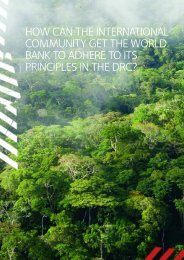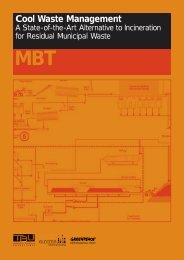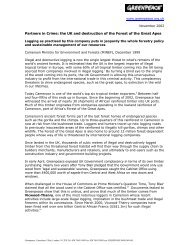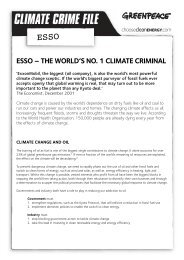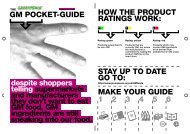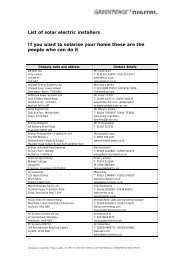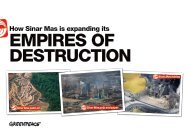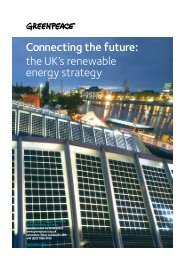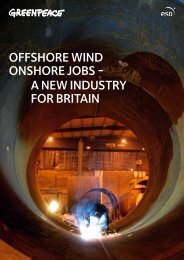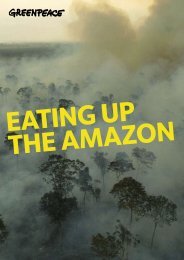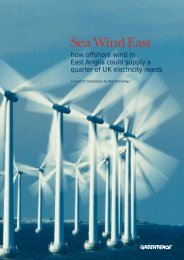How Sinar Mas is Pulping the Planet - Greenpeace
How Sinar Mas is Pulping the Planet - Greenpeace
How Sinar Mas is Pulping the Planet - Greenpeace
Create successful ePaper yourself
Turn your PDF publications into a flip-book with our unique Google optimized e-Paper software.
8<br />
13 August 2001<br />
ASIA’s<br />
WORST<br />
DEAL<br />
Wall Street peddled nearly $6 billion<br />
in bonds for Asia Pulp & PAPer before<br />
<strong>the</strong> Singapore company defaulted. A<br />
cautionary tale of greed, blind optim<strong>is</strong>m,<br />
and <strong>the</strong> East-West divide.<br />
APP – <strong>the</strong> wIDjaja’s<br />
PULP eMPIre<br />
The Widjaja family <strong>is</strong> probably<br />
best known for escaping <strong>the</strong> Asian<br />
financial cr<strong>is</strong><strong>is</strong> of <strong>the</strong> 1990s. 108 The<br />
APP group, considered <strong>the</strong> Widjaja<br />
‘family treasure’, 109 defaulted on nearly<br />
USD 14 billion in debt. 110 Although APP<br />
was technically bankrupt, <strong>the</strong> Widjaja<br />
family succeeded, with support from<br />
<strong>the</strong> Indonesian Government, 111 in<br />
restructuring approximately USD 6.5<br />
billion of <strong>the</strong> original debt. 112 Th<strong>is</strong> was<br />
<strong>the</strong> largest ever restructuring in<br />
Sou<strong>the</strong>ast Asia. 113<br />
The final restructuring agreement<br />
meant that <strong>the</strong> Widjajas managed to<br />
keep control of APP 114 and would only<br />
have to start paying <strong>the</strong> bulk of <strong>the</strong><br />
debt between 2015 and 2025. 115 At <strong>the</strong><br />
end of 2009, APP’s Indonesian mills<br />
still owed at least USD 4.2 billion of<br />
<strong>the</strong> restructured debt. 116 In October<br />
2007, APP China owed approximately<br />
USD 1 billion to overseas private<br />
banks as well as government export<br />
credit agencies. 117<br />
The APP group <strong>is</strong> now run by one of<br />
Eka Widjaja’s sons, Teguh Ganda<br />
Widjaja. In 2008, Pulp & Paper<br />
International magazine rated him <strong>the</strong><br />
most powerful man in <strong>the</strong> pulp and<br />
paper sector worldwide. 118<br />
With a total pulp and paper capacity<br />
of over 7 million tonnes per year, 119 <strong>the</strong><br />
group <strong>is</strong> now Indonesia’s largest pulp<br />
and paper producer and, 120<br />
toge<strong>the</strong>r<br />
with its production capacities in China,<br />
<strong>is</strong> <strong>the</strong> fourth largest worldwide. 121 Its pulp<br />
mill PT Indah Kiat <strong>is</strong> one of <strong>the</strong> largest<br />
mills in <strong>the</strong> world, producing nearly two<br />
million tonnes of pulp per year. 122<br />
Following a massive expansion of<br />
its t<strong>is</strong>sue production in <strong>the</strong> last few<br />
years, in 2008 <strong>the</strong> APP group became<br />
<strong>the</strong> fifth largest t<strong>is</strong>sue producer<br />
worldwide. 123 More recently, it has set<br />
up new sales networks in <strong>the</strong> US, 124<br />
UK 125 and Spain, 126 and expanded its<br />
production capacities in Australia, 127<br />
Canada, 128 China 129 and <strong>the</strong> US. 130<br />
Part of <strong>Sinar</strong> <strong>Mas</strong>’ expansion strategy<br />
has been to establ<strong>is</strong>h itself as a key<br />
player in <strong>the</strong> t<strong>is</strong>sue paper markets<br />
of North America, 131 Europe 132 and<br />
Australia. 133 <strong>Sinar</strong> <strong>Mas</strong> affiliated<br />
companies, such as Solar<strong>is</strong> and<br />
Mercury, market both APP branded<br />
products (Livi,Paseo), and manufacture<br />
own label products for retailers. 134 These<br />
products include facial and toilet t<strong>is</strong>sue,<br />
paper napkins and towels. 135<br />
In China, APP recently set up <strong>the</strong><br />
world’s largest paper machine at its<br />
Hainan Jinhai Pulp & Paper mill, where<br />
it expects to produce almost 1.5 million<br />
tonnes of coated fine paper per year 136<br />
for products such as magazines and<br />
brochures. APP now claims to be <strong>the</strong><br />
largest producer of pulp, paper and<br />
t<strong>is</strong>sue products in China. 137<br />
By <strong>the</strong> end of 2007, <strong>Sinar</strong> <strong>Mas</strong><br />
Forestry – APP’s “exclusive supplier”<br />
in Indonesia 138 – controlled at least 2.4<br />
million hectares of concessions for<br />
conversion into pulpwood plantations. 139<br />
Over a quarter of <strong>the</strong>se concessions<br />
were still forested in 2006. 140 Almost half<br />
of <strong>the</strong> area establ<strong>is</strong>hed with pulpwood<br />
plantations <strong>is</strong> located on peatland. 141<br />
Over 50,000 hectares of plantations <strong>is</strong><br />
on peat deeper than three metres. 142 It<br />
<strong>is</strong> illegal to destroy peatland over three<br />
metres deep under Indonesian law. 143<br />
According to mapping analys<strong>is</strong> conducted<br />
by <strong>the</strong> World Wildlife Fund (WWF), APP’s<br />
two pulp mills in Sumatra are responsible<br />
for more loss of rainforest on <strong>the</strong> <strong>is</strong>land than<br />
any o<strong>the</strong>r company. 144 Since APP began<br />
operations <strong>the</strong>re in <strong>the</strong> 1980s, <strong>the</strong> company<br />
<strong>is</strong> estimated to have pulped more than one<br />
million hectares of rainforest (an area a<br />
third <strong>the</strong> size of Belgium) 145 in <strong>the</strong> Sumatran<br />
provinces of Riau and Jambi alone. 146


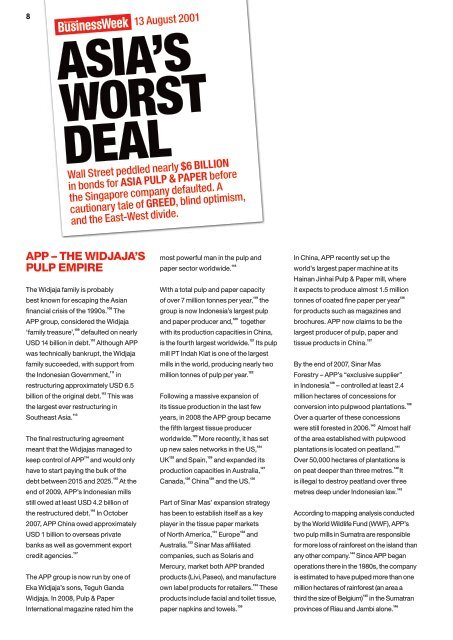
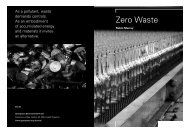
![[2007] EWHC 311 - Greenpeace UK](https://img.yumpu.com/22079793/1/184x260/2007-ewhc-311-greenpeace-uk.jpg?quality=85)
